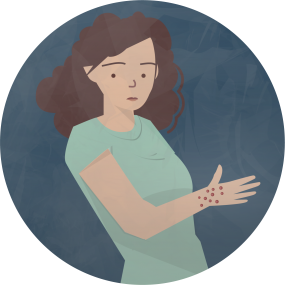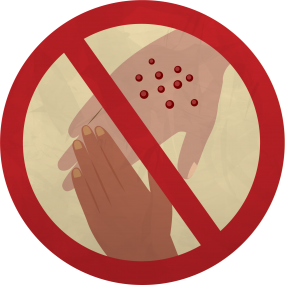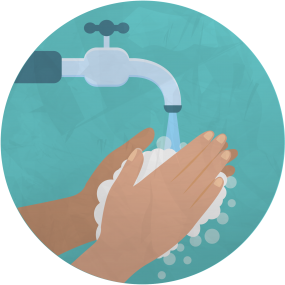What You Need to Know about Mpox if You are a Teen or Young Adult
What is mpox?

Mpox is a rare disease.
- If you get mpox, you may have fever, chills, sore muscles, headache, or tiredness and then get a rash.
- Sometimes, you may get a rash first, followed by other symptoms.
- You might only get a rash without having the other symptoms. The rash may look like pimples or blisters.
- The rash is usually on the face, inside the mouth, and on other parts of your body like your hands, chest, and genitals.
- Even though you should get better in 2-4 weeks, you should see a healthcare provider as soon as you get symptoms that could be from mpox.
- If you have a weakened immune system (from HIV, cancer, an organ transplant, or other reason), are pregnant, or have other skin problems like eczema, you may become more severely ill from mpox.
How do you get mpox?
Mpox does not spread easily between people.

- You can get mpox from close, skin-to-skin contact with a person who has a rash or scabs from mpox.
- For example, this can include during hugging, cuddling, a massage, or close contact sports.
- It also includes contact with spit droplets during close conversation and kissing.
- It can also spread through sexual contact including touching the genitals, and oral, anal, or vaginal sex.
- You can also get mpox from contact with objects, fabrics (clothing, bedding, or towels), and surfaces that have been used by someone with mpox.
What can I do to protect myself?

The best way to protect yourself from mpox is to avoid skin-to-skin contact with anyone who has a rash that looks like mpox.
- If you know that a friend or family member has been diagnosed with mpox:
- Try to avoid contact with them if possible.
- If you must be within 6 feet of them, you should wear a respirator or well-fitting mask and they must wear a well-fitting mask.
- Do not share silverware or cups.
- Do not touch their sheets, blankets, towels, or clothing. If you do touch any of these things, you should wash your hands with soap and water or use an alcohol-based hand sanitizer.
- If you are sexually active:
- Talk to your partner about any recent illnesses.
- Be aware of any new or unexplained rashes on your body or your partner’s body, including the genitals and butt.
- If you or your partner have recently been sick, currently have symptoms of mpox, or have a new or unexplained rash, do not kiss, cuddle, hug, touch each other’s genitals, or have oral, vaginal, or anal sex.
What should I do if I think I have mpox?
If you have a new or unexplained rash or other symptoms of mpox, see a healthcare provider or your school health clinic. You can also visit a public health clinic. A public health clinic can be a good option if you don’t have a regular doctor or insurance. Let the doctor or nurse know you are worried about mpox.
If you think you have mpox, cover all parts of the rash with clothing, gloves, or bandages, and wear a mask. Remember to:
- Avoid touching anyone until you have been to the doctor.
- If your test result is positive, follow your healthcare provider’s recommendations.
- Wash your hands often and try not to touch your eyes. If you wear contact lenses, wear glasses instead, if possible, to avoid infecting your eyes.
- Stay in a space away from others until your rash has healed, all scabs have fallen off, and a fresh layer of intact skin has formed. This may mean wearing a mask around others in the place you live and cleaning and disinfecting frequently.
- You should try to avoid contact with pets and with people who are more likely to get very sick, like children under 8 years old, people who are pregnant, and people who have weakened immune systems or certain skin conditions.
If I have questions, who can answer them?
If you have questions and feel comfortable, talk to a parent or other trusted adult.
It’s important to talk honestly with a healthcare provider about any concerns you may have about mpox, especially if you know you spent time with someone who had mpox. You can request time alone with a healthcare provider at your next visit to discuss your concerns in private.